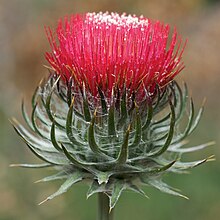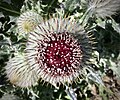| Cirsium occidentale | |
|---|---|

| |
| Flower head of Cirsium occidentale | |
|
Scientific classification
| |
| Kingdom: | Plantae |
| Clade: | Tracheophytes |
| Clade: | Angiosperms |
| Clade: | Eudicots |
| Clade: | Asterids |
| Order: | Asterales |
| Family: | Asteraceae |
| Genus: | Cirsium |
| Species: | C. occidentale
|
| Binomial name | |
| Cirsium occidentale | |
| Synonyms [2] | |
|
Cirsium coulteri | |
Cirsium occidentale, with the common name cobweb thistle or cobwebby thistle, is a North American species of thistle in the family Asteraceae. [3]
Cirsium occidentale is a biennial plant or perennial plant forming a taproot. It may be short or quite tall, forming low clumps or towering to heights approaching 3 meters (10 feet). The leaves are dull gray-green to bright white due to a coating of hairs, and the most basal ones on large plants may be nearly 0.5 m (1+1⁄2 ft) in length. [4] [3] The petioles are winged and spiny and the leaves are toothed or edged with triangular lobes. [5]
The inflorescence at the top of the whitish stem holds one to several flower heads. Each head is sphere-like, covered in large phyllaries with very long, spreading spines which are laced, often quite heavily, in fibers resembling cobwebs. [5]
The head is packed with disc florets which may be white to blood red to shades of purple. The largest flower heads exceed 8 centimeters (3 inches) in diameter. [4] The heads do not open in synchrony, perhaps allowing greater likelihood of being pollinated. [5]
There are several varieties, which differ from each other in range and form: [4]
- Cirsium occidentale var. californicum — California thistle [6]
- Cirsium occidentale var. candidissimum — snowy thistle [7] [8]
- Cirsium occidentale var. compactum — compact cobwebby thistle; a short, clumpy California endemic that grows only along the coast of the San Francisco Bay Area and the Central Coast of California [9]
- Cirsium occidentale var. coulteri — Coulter's thistle [10]
- Cirsium occidentale var. lucianum — Cuesta Ridge thistle; a California endemic from the Santa Lucia Range [11]
- Cirsium occidentale var. occidentale — cobwebby thistle [12]
- Cirsium occidentale var. venustum [13] [14]
The plant is widespread and fairly common across most of California: in its mountain ranges, valleys, and the Mojave Desert; and in the western Great Basin region in western Nevada, southern Oregon, and southwestern Idaho. [15] [4] [16]
Unlike many introduced thistles, this native species is not a troublesome weed.
It is a larval host to the California crescent, mylitta crescent, and the painted lady butterfly. [17]
-
California thistle
-
C. occidentale var. compactum blooming
-
C. occidentale
-
C. occidentale var. candidissimum
-
C. occidentale var. candidissimum flower
-
C. occidentale var. occidentale flower with seed head forming
- ^ "NatureServe Explorer". NatureServe Explorer. NatureServe. 2022. Retrieved 19 May 2022.
- ^ The Plant List, Carduus occidentalis Nutt.
- ^ a b "Cirsium occidentale Calflora". www.calflora.org. Retrieved 17 May 2024.
- ^ a b c d Jepson Flora Project (ed.). "Cirsium occidentale". Jepson eFlora. The Jepson Herbarium, University of California, Berkeley.
- ^ a b c Flora of North America, Western thistle, Cirsium occidentale (Nuttall) Jepson
- ^ Jepson Flora Project (ed.). "Cirsium occidentale var. californicum". Jepson eFlora. The Jepson Herbarium, University of California, Berkeley.
- ^ "Plants Profile for Cirsium occidentale candidissimum (snowy thistle)". plants.usda.gov. Retrieved 2019-02-18.
- ^ Jepson Flora Project (ed.). "Cirsium occidentale var. candidissimum". Jepson eFlora. The Jepson Herbarium, University of California, Berkeley.
- ^ Jepson Flora Project (ed.). "Cirsium occidentale var. compactum". Jepson eFlora. The Jepson Herbarium, University of California, Berkeley.
- ^ Jepson Flora Project (ed.). "Cirsium occidentale var. coulteri". Jepson eFlora. The Jepson Herbarium, University of California, Berkeley.
- ^ Jepson Flora Project (ed.). "Cirsium occidentale var. lucianum". Jepson eFlora. The Jepson Herbarium, University of California, Berkeley.
- ^ Jepson Flora Project (ed.). "Cirsium occidentale var. occidentale". Jepson eFlora. The Jepson Herbarium, University of California, Berkeley.
- ^ "Plants Profile for Cirsium occidentale venustum (cobwebby thistle)". plants.usda.gov. Retrieved 2019-02-18.
- ^ Jepson Flora Project (ed.). "Cirsium occidentale var. venustum". Jepson eFlora. The Jepson Herbarium, University of California, Berkeley.
- ^ C.Michael Hogan ed. 2010. Cirsium occidentale. Encyclopedia of Life
- ^ Biota of North America Program 2014 county distribution map
- ^ The Xerces Society (2016), Gardening for Butterflies: How You Can Attract and Protect Beautiful, Beneficial Insects, Timber Press.
- Jepson Manual treatment — Cirsium occidentale
- Cirsium occidentale — Calphotos Photo gallery, University of California
-
 Media related to
Cirsium occidentale at Wikimedia Commons
Media related to
Cirsium occidentale at Wikimedia Commons
- NatureServe vulnerable species
- Cirsium
- Flora of the Western United States
- Natural history of the California chaparral and woodlands
- Natural history of the California Coast Ranges
- Natural history of the Mojave Desert
- Natural history of the Peninsular Ranges
- Natural history of the San Francisco Bay Area
- Natural history of the Santa Monica Mountains
- Natural history of the Transverse Ranges
- Plants described in 1901
- Taxa named by Thomas Nuttall
- Taxa named by Willis Linn Jepson
| Cirsium occidentale | |
|---|---|

| |
| Flower head of Cirsium occidentale | |
|
Scientific classification
| |
| Kingdom: | Plantae |
| Clade: | Tracheophytes |
| Clade: | Angiosperms |
| Clade: | Eudicots |
| Clade: | Asterids |
| Order: | Asterales |
| Family: | Asteraceae |
| Genus: | Cirsium |
| Species: | C. occidentale
|
| Binomial name | |
| Cirsium occidentale | |
| Synonyms [2] | |
|
Cirsium coulteri | |
Cirsium occidentale, with the common name cobweb thistle or cobwebby thistle, is a North American species of thistle in the family Asteraceae. [3]
Cirsium occidentale is a biennial plant or perennial plant forming a taproot. It may be short or quite tall, forming low clumps or towering to heights approaching 3 meters (10 feet). The leaves are dull gray-green to bright white due to a coating of hairs, and the most basal ones on large plants may be nearly 0.5 m (1+1⁄2 ft) in length. [4] [3] The petioles are winged and spiny and the leaves are toothed or edged with triangular lobes. [5]
The inflorescence at the top of the whitish stem holds one to several flower heads. Each head is sphere-like, covered in large phyllaries with very long, spreading spines which are laced, often quite heavily, in fibers resembling cobwebs. [5]
The head is packed with disc florets which may be white to blood red to shades of purple. The largest flower heads exceed 8 centimeters (3 inches) in diameter. [4] The heads do not open in synchrony, perhaps allowing greater likelihood of being pollinated. [5]
There are several varieties, which differ from each other in range and form: [4]
- Cirsium occidentale var. californicum — California thistle [6]
- Cirsium occidentale var. candidissimum — snowy thistle [7] [8]
- Cirsium occidentale var. compactum — compact cobwebby thistle; a short, clumpy California endemic that grows only along the coast of the San Francisco Bay Area and the Central Coast of California [9]
- Cirsium occidentale var. coulteri — Coulter's thistle [10]
- Cirsium occidentale var. lucianum — Cuesta Ridge thistle; a California endemic from the Santa Lucia Range [11]
- Cirsium occidentale var. occidentale — cobwebby thistle [12]
- Cirsium occidentale var. venustum [13] [14]
The plant is widespread and fairly common across most of California: in its mountain ranges, valleys, and the Mojave Desert; and in the western Great Basin region in western Nevada, southern Oregon, and southwestern Idaho. [15] [4] [16]
Unlike many introduced thistles, this native species is not a troublesome weed.
It is a larval host to the California crescent, mylitta crescent, and the painted lady butterfly. [17]
-
California thistle
-
C. occidentale var. compactum blooming
-
C. occidentale
-
C. occidentale var. candidissimum
-
C. occidentale var. candidissimum flower
-
C. occidentale var. occidentale flower with seed head forming
- ^ "NatureServe Explorer". NatureServe Explorer. NatureServe. 2022. Retrieved 19 May 2022.
- ^ The Plant List, Carduus occidentalis Nutt.
- ^ a b "Cirsium occidentale Calflora". www.calflora.org. Retrieved 17 May 2024.
- ^ a b c d Jepson Flora Project (ed.). "Cirsium occidentale". Jepson eFlora. The Jepson Herbarium, University of California, Berkeley.
- ^ a b c Flora of North America, Western thistle, Cirsium occidentale (Nuttall) Jepson
- ^ Jepson Flora Project (ed.). "Cirsium occidentale var. californicum". Jepson eFlora. The Jepson Herbarium, University of California, Berkeley.
- ^ "Plants Profile for Cirsium occidentale candidissimum (snowy thistle)". plants.usda.gov. Retrieved 2019-02-18.
- ^ Jepson Flora Project (ed.). "Cirsium occidentale var. candidissimum". Jepson eFlora. The Jepson Herbarium, University of California, Berkeley.
- ^ Jepson Flora Project (ed.). "Cirsium occidentale var. compactum". Jepson eFlora. The Jepson Herbarium, University of California, Berkeley.
- ^ Jepson Flora Project (ed.). "Cirsium occidentale var. coulteri". Jepson eFlora. The Jepson Herbarium, University of California, Berkeley.
- ^ Jepson Flora Project (ed.). "Cirsium occidentale var. lucianum". Jepson eFlora. The Jepson Herbarium, University of California, Berkeley.
- ^ Jepson Flora Project (ed.). "Cirsium occidentale var. occidentale". Jepson eFlora. The Jepson Herbarium, University of California, Berkeley.
- ^ "Plants Profile for Cirsium occidentale venustum (cobwebby thistle)". plants.usda.gov. Retrieved 2019-02-18.
- ^ Jepson Flora Project (ed.). "Cirsium occidentale var. venustum". Jepson eFlora. The Jepson Herbarium, University of California, Berkeley.
- ^ C.Michael Hogan ed. 2010. Cirsium occidentale. Encyclopedia of Life
- ^ Biota of North America Program 2014 county distribution map
- ^ The Xerces Society (2016), Gardening for Butterflies: How You Can Attract and Protect Beautiful, Beneficial Insects, Timber Press.
- Jepson Manual treatment — Cirsium occidentale
- Cirsium occidentale — Calphotos Photo gallery, University of California
-
 Media related to
Cirsium occidentale at Wikimedia Commons
Media related to
Cirsium occidentale at Wikimedia Commons
- NatureServe vulnerable species
- Cirsium
- Flora of the Western United States
- Natural history of the California chaparral and woodlands
- Natural history of the California Coast Ranges
- Natural history of the Mojave Desert
- Natural history of the Peninsular Ranges
- Natural history of the San Francisco Bay Area
- Natural history of the Santa Monica Mountains
- Natural history of the Transverse Ranges
- Plants described in 1901
- Taxa named by Thomas Nuttall
- Taxa named by Willis Linn Jepson






